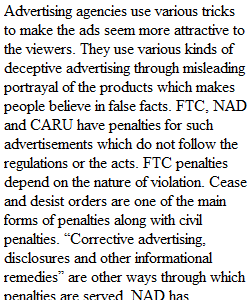


Q Step 1: Familiarize yourself with the FTC, NAD, and CARU. In addition to information in the textbook, please explore the following links: 1. http://www.ftc.gov/ 2. http://www.asrcreviews.org/ 3. http://www.asrcreviews.org/category/caru/ What kind of penalties does each impose? What are the standards for deceptive advertising and children? Why are they different from advertisements aimed at adults? Step 2: Read the FTC’s policy statement on deception. http://www.ftc.gov/ftc-policy-statement-on-deception Step 3: Be ready to discuss the following. Exaggeration in advertising is not the same as deceptive advertising. How can we tell the difference? What marks the distinction? Step 4: Locate an example of deceptive advertising. Please place a link to your ad or an image of your ad (if print) in your post. Discuss what deceptive advertising practices were used. Who filed the complaint (individual, business, industry group, federal or state regulating agency, etc)? What was the outcome or penalty (if there was one)? Do you agree or disagree with the outcome or penalty? Why?
View Related Questions